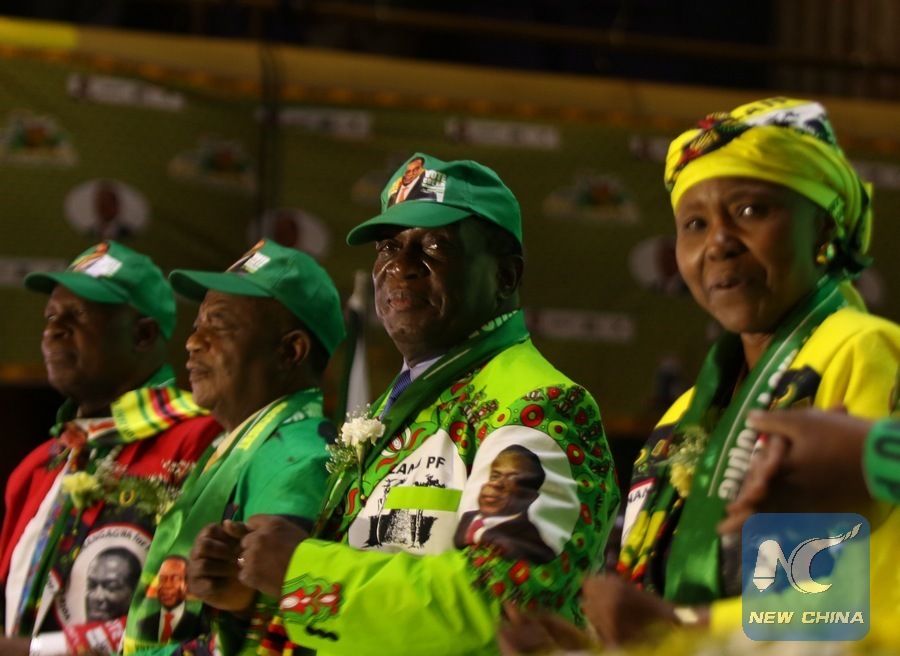
Zimbabwean President Emmerson Mnangagwa (2nd, R) attends the launching ceremony of the ruling ZANU-PF's 2018 election manifesto and campaign in Harare, Zimbabwe, May 4, 2018. Emmerson Mnangagwa on Friday launched the ruling ZANU-PF's 2018 election manifesto and campaign as it steps up preparations for national polls set for mid-year. (Xinhua/Shaun Jusa)
by Tichaona Chifamba
HARARE, July 1 (Xinhua) -- Zimbabwe is enjoying relative peace ahead of the July 30 general elections despite the bomb attack targeting President Emmerson Mnangagwa last Saturday.
Unlike in previous elections, there have been no reports of inter-party violence so far with political parties holding campaign rallies and meetings peacefully.
The major protagonists in the elections are Mnangagwa (75) of the ruling Zanu-PF and Nelson Chamisa (40) of the MDC Alliance which groups seven political parties.
The two have been holding well-attended rallies throughout the country with Chamisa also being able to do so in rural areas which were once no-go areas for the opposition.
A number of international organizations such as the European Union and the joint National Democratic Institute and the International Republican Institute from the United States have already deployed short, medium and long-term observers following Mnangagwa's invitation to the international community.
Various local organizations are carrying out voter education programs.
According to the Zimbabwe Electoral Commission (ZEC), 133 political parties had registered to contest in the elections, but the number declined drastically during nomination as some aspiring candidates failed to raise nomination fees while other parties reportedly failed to get candidates willing to contest on their tickets.
The elections will see 23 candidates contesting for the presidency, among them leaders of peripheral parties which have not held rallies.

Zimbabwean President Emmerson Mnangagwa addresses a rally of ruling party ZANU-PF in Mutare, Zimbabwe, May 19, 2018. Emmerson Mnangagwa said Saturday that he will proclaim the 2018 election date at the end of May. (Xinhua/Shaun Jusa)
Opposition leader Thokozani Khupe who is contesting under the banner of the MDC-T formerly led by former Prime Minister Morgan Tsvangirai was recently running road shows and is the one most likely to split the opposition vote in the MDC camp.
Together with Chamisa and former cabinet minister Elias Mudzuri, she was a co-vice president to Tsvangirai but was beaten by Chamisa during leadership contest following Tsvangirai's death in February.
However, she rejected the new leadership and went on to register with ZEC as leader of the MDC-T, leaving Chamisa and his faction to contest under the Alliance banner with six other parties.
Former state Vice President Joice Mujuru, who was fired by then President Robert Mugabe in 2014, is also contesting the presidency as leader of the People's Rainbow Coalition which has brought together a number of small parties.
Some candidates for the legislature are trying to out-do each other, particularly in rural areas where they are working on community development projects and dishing out basic commodities to voters.
Opinion polls have so far given victory to Mnangagwa, although the opposition has dismissed the findings as "cooked up".
Mnangagwa has promised the international community that the elections will be free, fair and credible but opposition parties have not been happy with the way ZEC has been handling the voters' roll which was not yet ready before the nomination courts sat.

